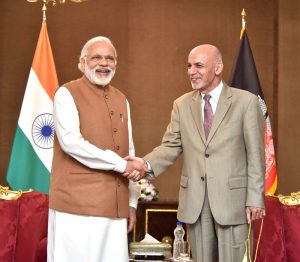Indian Foreign Minister S. Jaishankar remotely addressed participants at the inaugural day of the intra-Afghan negotiations in Doha on September 12 in a sign that New Delhi could potentially agree to directly talk to the Taliban at some point in the future. While the U.S. Special Representative for Afghanistan Reconciliation Zalmay Khalilzad noted in May this year that the U.S. supported such talks, were they to happen, it would mark a major shift in Indian policy. (Khalilzad is expected to visit New Delhi again tomorrow.)
As Carnegie India scholars Rudra Chaudhuri and Shreyas Shende wrote earlier this year, India’s Afghanistan policy has been shaped by three perceived risks to Indian interests: the risk of terrorism, Pakistan’s influence in Afghanistan, as well as a persistently fractured government in Kabul. Continued U.S. military presence in Afghanistan served a limited albeit ineffectual mitigator to these risks. But with the start of a possible compromise between the Taliban and other Afghan stakeholders in the run up to a complete U.S. military withdrawal from Afghanistan, New Delhi now must decide whether it wants to be at the table with very few cards in hand – when it comes to the intra-Afghan negotiations, Pakistan, Iran, or sundry other relevant players – or be sidelined altogether.
Essentially, it boils down to this: India can directly talk to the Taliban and offer inducements, economic and otherwise, to protect its interests; it can talk to Pakistan and discuss Afghanistan within a larger framework that includes Kashmir; or it could diplomatically engage other powers, as Chaudhuri and Shende suggest, to shape the emerging non-optimal equilibrium in Afghanistan where — independent of the outcome of the intra-Afghan talks — the Taliban remains a major actor and security disruptor.
None of these possibilities look optimistic.
Let us start with the carrots-for-Taliban plan. A September 8 Financial Times report suggests that China has offered to build a road network for the Taliban in return of their support for peace in Afghanistan. One Pakistani tribal leader close to the Taliban told the newspaper, “[t]he Chinese promise is led by a road network across Afghanistan. Once such a network is built with six-lane highways, the Chinese have said local commerce and trade will flourish.” Kabul and Beijing have already pledged to work together under the Belt and Road Initiative; it is likely that China is now trying to draw the Taliban — which one Chinese expert described as “supported by the poor people who make up more than half of the country’s population” — in to the scheme as well.
Whether or not Beijing follows through on this – its investments in Afghanistan remain relatively small – it is unlikely India will be able to offer something similar New Delhi’s considerable investments in that country so far not withstanding. India’s track record when it comes to delivering on infrastructure projects in its neighborhood have not exactly been stellar in the past. At the same time despite reaching out to China in the past, the possibility of India working with that country on Afghanistan appears remote right now given sky high current tensions between the two over Eastern Ladakh.
The second possibility of talking to Pakistan to arrive at a modus vivendi – whether in Afghanistan or Kashmir or both – remains dead on arrival. The Modi government has explicitly ruled out talks with Pakistan. Its decisions last August on Jammu and Kashmir, I argued here at that time, foreclosed any possibility of a negotiated solution to the Kashmir dispute. Under such circumstances it is completely unclear why Pakistan may oblige India when it comes to Afghanistan – or why it will not try and exert as much pressure as possible on India through it proxies in Afghanistan, the Taliban included.
Similarly, coordinating India’s Afghanistan policy with Iran remains unlikely not the least because India’s lack of delivery on key projects there, including a rail-line which would have connected Iran’s Chabahar port with Zahedan on its border with Afghanistan. (A recent backgrounder on India-Iran ties, and the role China could potentially play in upending it, is here.)
That leaves us with the Sunni states in the Persian Gulf, and Russia. An uptick in India’s relationships with Saudi Arabia and the United Arab Emirates have been one of Prime Minister Narendra Modi’s foreign policy highlights. But the Saudis under Crown Prince Mohammed bin Salman have adopted a hardline strategy toward the Taliban; because of these efforts, it is unclear to what extent they still enjoy leverage over that group. Similarly, the UAE is not in the best of terms with the Taliban. Reports emerged last year that its Crown Prince Mohammed bin Zayed had proposed assassinating Taliban leaders. India’s relationship with Russia offers greater hope in terms of Moscow taking up India’s Afghanistan cause, but only modestly so.

































